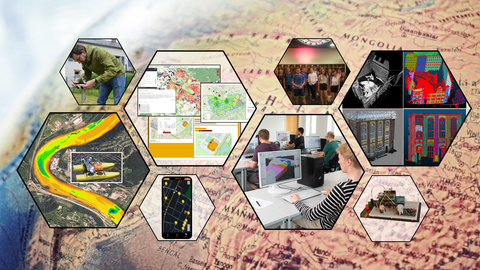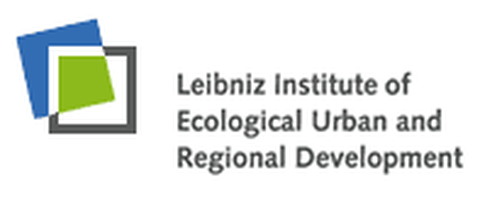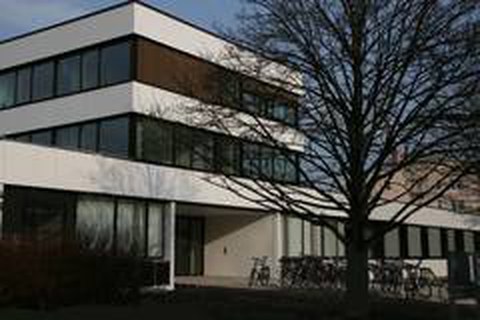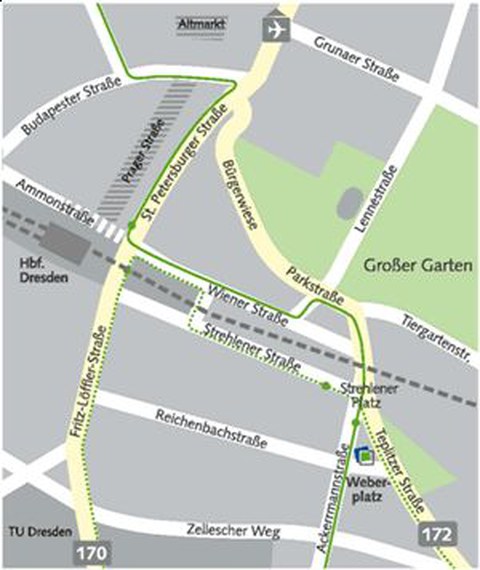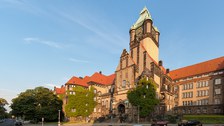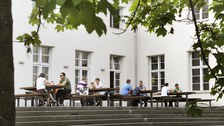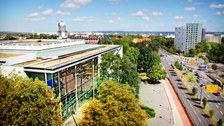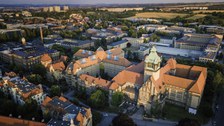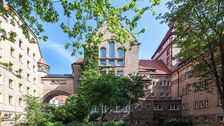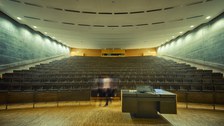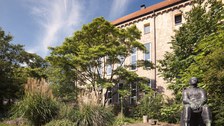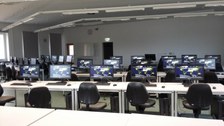M.SC. Spatial Development and Natural Resource Management - For prospective students
Table of contents
Degree program with aptitude test
After you have applied for the degree program via online application, you apply for the aptitude assessment procedure.
Further details can be found in the course-specific aptitude assessment regulations.
With your application, please also submit the application for assessment of special aptitude for the Master's degree program in Spatial Development and Natural Resource Management - also possible in English.
A prerequisite for admission to the Master's degree program in Spatial Development and Natural Resource Management is a degree in a subject-related degree program obtained in Germany or abroad at a university or equivalent institution of higher education with a standard period of study of at least six semesters (min. 180 ECTS).
Admission to the consecutive Master's degree program in Spatial Development and Natural Resource Management is open (§3 of the study regulations) to those who:
- have a first professionally qualifying university degree or a degree from a state or state-recognized university of cooperative education in a field related to spatial development or natural resources,
- have a solid knowledge of English at level B2 of the Common European Framework of Reference for Languages and
- provides proof of special aptitude for the consecutive Master's degree course in Spatial Development and Natural Resource Management.
The special aptitude exists if proof of sufficient knowledge from at least three modules amounting to 15 ECTS in subject-related areas of spatial development or natural resources such as natural sciences, forestry, hydro- or geosciences or urban, spatial and transport planning or comparable. The admissions committee will check proof of special aptitude on the basis of the documents enclosed with the application.
Questions about the admission requirements can be directed to the degree program advisor at any time. The course can only be started in the winter semester. You can find an overview of the essential information and application instructions in the TU Dresden's study information system.
The application deadline is May 31 for all applicants with a foreign university degree and June 30 for all other applicants.
|
Important note: Would you like to start a Master's degree program but have not yet successfully completed your Bachelor's thesis? If you have completed at least 80% of your coursework to date, you should apply to the Admissions Office
|
General information about the degree program
The Master's degree program in Spatial Development and Natural Resource Management is an interdisciplinary degree program with a high degree of practical relevance. The focus of the program is on combining knowledge of spatial and natural sciences with socio-economic and planning knowledge as well as implementation in practice and application-oriented basic research. It builds on long-standing traditions and utilizes the experience and expertise in environmental and spatial science research and teaching in cooperation with natural science, engineering, economics and social science departments at TU Dresden and its research partners.
The program combines courses from all Departments of Environmental Sciences (Forestry, Geosciences and Hydrosciences) as well as courses from the Faculties of Architecture and Transport Sciences. Leading non-university institutions in the field of spatial and environmental sciences with a national, European and international orientation are involved in teaching. These are in particular the Leibniz Institute of Ecological Urban and Regional Development (IÖR) in Dresden and the Helmholtz Centre for Environmental Research (UFZ) in Leipzig.
Contents of the course
The four-semester Master's degree course in Spatial Development and Natural Resource Management focuses on the current challenges facing our society at the interface between environmental sciences and spatial planning. This includes the following questions:
- How can cities and regions pursue sustainable development in times of globalization and demographic change?
- How can disturbed ecosystems, such as post-mining landscapes, be successfully revitalized?
- How can spatial development and natural resource management contribute to the preservation of cultural landscapes and biodiversity?
- What risk management options are there for responding to the challenges of climate change?
Students on our Master's degree course can find answers to these and many other questions. They learn to analyze and evaluate relevant problems and develop practical solutions.
What can I do after graduation?
Thanks to their interdisciplinary and internationally oriented education, graduates of the Master's degree course are able to tackle diverse and complex tasks at the interface of spatial and environmental development, which require the integration of scientific findings into social contexts, both locally and regionally as well as internationally, in professional practice and in research.
In the field of research, there are many opportunities for employment at universities and non-university research institutions. In addition, graduates of the Master's degree course can work in public administration, for example in urban, regional and state planning, in the field of specialist planning and in environmental monitoring. Working in environmental and nature conservation associations as well as in national and international non-governmental organizations is another professional field. There are also opportunities to work in private planning offices and in the consulting sector, particularly in the energy, raw materials and construction industries, as well as in the consulting and insurance sector.
Why study Spatial Development and Resource Management (M.Sc.) at TU Dresden?
There are many reasons to choose to study in the state capital of Dresden. With over 30,000 students, TUD Dresden University of Technology is one of the largest technical universities in Germany and has been one of the German Universities of Excellence since 2012. Studying at TU Dresden is characterized by a wide variety of courses, internationality and family friendliness.
The Faculty of Environmental Sciences is unique in Germany in combining the three environmental science fields of forestry, geosciences and hydrosciences, and this interdisciplinary and international orientation is reflected not only in research but also in teaching. The diverse activities of our Faculty's 47 Chairs in research and teaching are intensively networked both regionally and internationally.
The state capital Dresden is considered one of the most liveable cities in Germany:
- Whether graceful baroque buildings in the old town or the charming trendy district in Dresden Neustadt - traversed by the bends of the river Elbe, Dresden's beautiful city center captivates with a wealth of cultural impressions.
- The large number of parks and green spaces make Dresden one of the greenest cities in Europe.
- Numerous bars, pubs and clubs offer plenty of opportunities to turn night into day and have a good time.
- The area surrounding the city offers spectacular natural landscapes, such as the Dresden Heath or Saxon Switzerland.
- Other cultural cities, such as Prague, Berlin, Görlitz or Wrocław, are very easy to reach from Dresden.
Cooperation partner
Leibniz Institute of Ecological Urban and Regional Development
The Leibniz Institute of Ecological Urban and Regional Development (IOER) is a leading non-university research institution in the field of spatial and environmental sciences with a national, European and international focus. Among other things, it is involved in teaching on the Master's degree program "Spatial Development and Natural Resource Management" as part of joint appointments.
The IOER's research focuses on the requirements for sustainable regional, urban and landscape development, the investigation of interdependencies between land use and the natural environment and the development of strategies for sustainable and environmentally friendly spatial development. Important influencing factors here are climate change and demographic change as well as their effects on future environmental and spatial development.
The IOER's current core research areas include:
- Environmental quality in cities and regions;
- Resource efficiency of settlement structures;
- Environmental risks in urban and regional development;
- Monitor of settlement and open space development.
You can find out more about the work of the IOER at: www.ioer.de.
How to get there
The easiest way to reach the IOER from the main campus of TU Dresden is to take the line
61 in the direction of Weißig. From the Zellescher Weg stop, it is a 200 m walk along Ackermannstraße towards the city center. You will then reach the institute building at Weberplatz.
Our campus - the place to study
You will study in the Departments of Geosciences and Hydro Sciences on the main campus of TU Dresden in the Südvorstadt district. Chairs of the Department of Geosciences, the Student Advisory Service, the Department Office and the Dean's Office of the Faculty of Environmental Sciences are located in the Hülße Building. The majority of your courses take place there, as well as in the adjoining Georg Schumann Building and the Auditorium Center. The PCs in the geopools in the Hülße-Bau and the adjacent Tillich-Bau can be used before taking a break in the cafeteria "insgrüne coffeebar". Our picture collection provides a small insight for you. The Chairs of the Department of Hydro Sciences can be found in the new Chemistry building. The Department of Forest Sciences is located on the Tharandt campus.
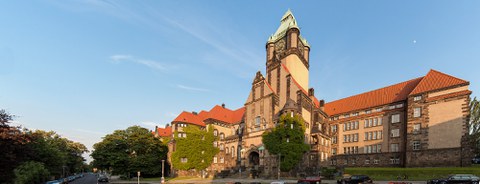
© TU Dresden
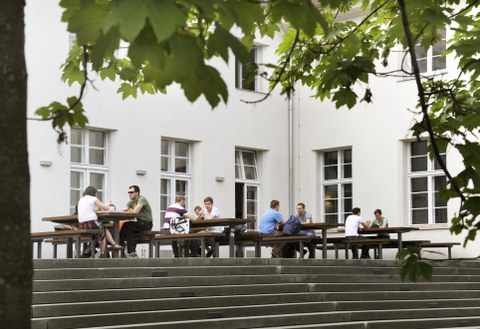
© TU Dresden
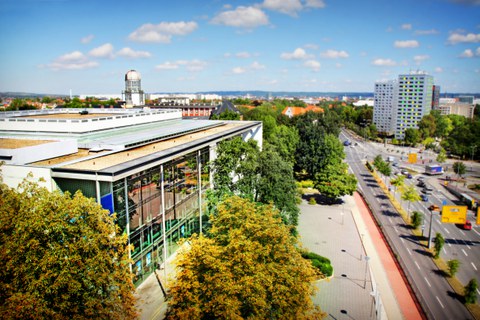
© TU Dresden
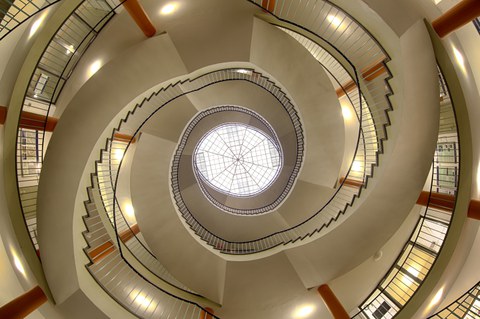
© TU Dresden
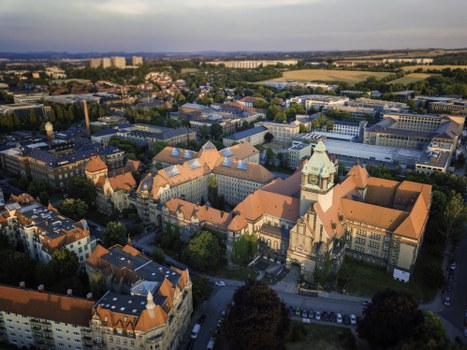
© TU Dresden
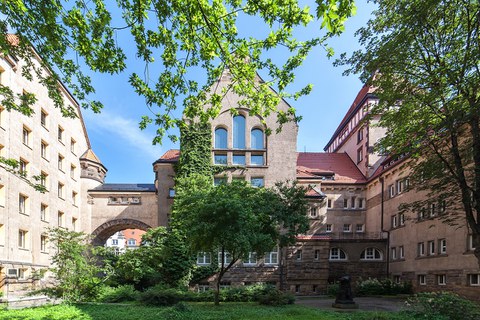
© TU Dresden
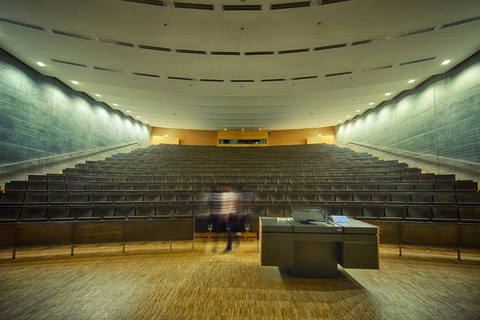
© TU Dresden
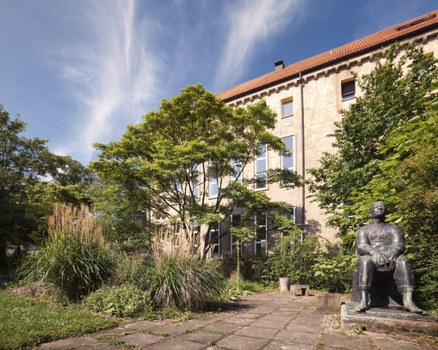
© TU Dresden
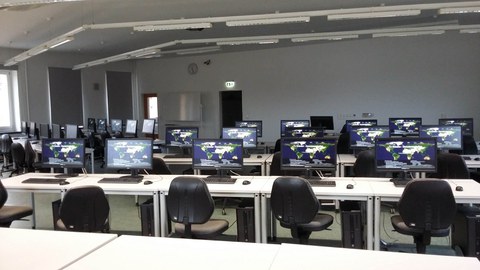
© P. Thiemt
If you are curious , you can find further important information and conditions for the degree program, such as study requirements, deadlines and the application link in our central study information system.
Spatial Development and Resource Management (M.Sc.)
If you arealready studying Spatial Development and Resource Management (M.Sc.) at TU Dresden , you will find all information relevant to your studies under Information for Students.
Contact and advice
Do you have any questions about your studies or application? Our contact persons will be happy to help you.
Faculty of Environmental Sciences
Scientific programme coordinator
NameDr. Christopher-Bastian Roettig
Send encrypted email via the SecureMail portal (for TUD external users only).
Students programme coordinator
NameN N
Send encrypted email via the SecureMail portal (for TUD external users only).
Course advisor
NameProf. Dipl.-Phys. Dr.-Ing. habil. Dirk Burghardt
Send encrypted email via the SecureMail portal (for TUD external users only).
Chairperson of the Examination Board
NameProf. Dr. Goddert von Oheimb
Send encrypted email via the SecureMail portal (for TUD external users only).
Chairperson of the Committee on the Curriculum
NameProf. Dr. Karsten Kalbitz
Send encrypted email via the SecureMail portal (for TUD external users only).
Examination office
NameAndrea Breitung
Send encrypted email via the SecureMail portal (for TUD external users only).
Course-related information and advice
NameDr. Katja Lohse
Send encrypted email via the SecureMail portal (for TUD external users only).
Departmental student advice
NameMichael Rockstroh
Send encrypted email via the SecureMail portal (for TUD external users only).
Admissions office
NameMarlen Roßberg
Send encrypted email via the SecureMail portal (for TUD external users only).
Short Facts
|
Degree |
Master of Science (MSc) |
|
Standard period of full-time study |
4 semesters (2 years) |
|
Standard period of study part-time |
8 semesters (4 years) |
|
Language of instruction |
German, partly English |
|
Tuition fees per semester |
Semester fee and, if applicable, second and long-term study fees |
|
Type of study |
Direct study |
|
Type of study |
postgraduate, admission restricted |
|
Start of studies |
First semester: winter semester |
| Application deadline | For applicants with a German university degree
Application period for aptitude assessment procedure: The following applies to applicants with a foreign university degree |

